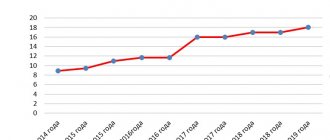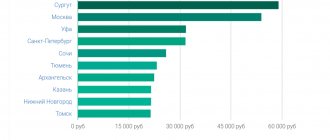Author: Ivan Ivanov
How much a conductor earns on trains on Russian railways is of interest to many people. Some are planning to temporarily work during the season, others are thinking about choosing a profession.
The average salary of a railway conductor is about 25,000 rubles per month. But this figure equalizes the qualifications of these specialists, the routes on which the conductor works, experience and education.
The minimum that conductors receive in Russia is 14,000 rubles, and the maximum is 45,000 and above. What does real earnings depend on in this profession?
Average salary in Moscow, regions of Russia and CIS countries
Beginner guides without experience are invited to a salary of 25,000 rubles. A different level of earnings awaits railway car conductors with experience and qualifications. On prestigious branded trains such as Sapsan you can count on 35,000 per month.
A number of regions have consistently been leaders in salary levels for conductors for many years:
- Chechnya;
- Amur region;
- Novgorod region;
- Murmansk region;
- Republic of Karelia.
The average salary of a conductor in the Krasnoyarsk Territory and Buryatia is above 30,000 rubles.
In other regions, the average salary of a conductor is much lower: it is about 17,000 rubles.
In the former Soviet republics, locomotive carriage workers live no better than their colleagues from the Russian provinces. In some cases, the salary of conductors is even less than in Russia.
In Belarus, the average salary for railway conductors is 450 rubles in local currency or $225 per month. In Ukraine, the salary of a conductor is even less: about 200 dollars or 5,500 hryvnia. Statistics for Kazakhstan and Tajikistan show even more modest figures.
Professional Responsibilities
Some applicants think that this is a very simple profession. But there are many difficulties here - an unusual work schedule, difficult interlocutors. Guides have to perform many tasks at once, and at the same time do each of them efficiently. Therefore, such professions are not suitable for everyone.
It must be remembered that such people work primarily in the service sector.
In addition to direct interaction with passengers, the employee’s responsibilities include:
- ensuring order in the carriage assigned to a specific conductor,
- checking passengers' tickets and documents,
- ensuring the provision of bed linen,
- maintaining cleanliness in the carriage,
- tracking of boarding and disembarking, as well as timely notification of approaching a specific station,
- in the event of disputes, fights and various unforeseen situations, the employee has the right to call higher authorities, i.e. police or train manager.
The conductor's salary is calculated based on the number of flights he made per month, what kind of flights they were - local or long-distance, how many hours he was on the flight, and whether he fulfilled the sales plan for products and services.
Don’t be surprised, conductors also have a sales plan, after completing which they can count on a certain bonus. If such a plan is carried out by the entire train, then the premium increases by 1.5-2 times.
According to Russian Railways rules, the number of days a conductor spends on the road is the same amount he must spend at home. It is not difficult to guess that a conductor can work no more than 15 days a month.
Salaries are affected by the following indicators:
- Season of work.
- Travel range.
- Difficulty of moving.
- Number of days worked, how many of them are night travel.
- Train class.
We have collected original reviews on this topic here, reviews from real people, many comments, worth reading.
What does a conductor's salary depend on?
The salaries of conductors on Russian railways vary greatly depending on the region. There are many factors influencing personal income. Among them, employment comes first. Further:
- number of hours worked;
- flight range;
- qualification;
- length of service in the position;
- number of night shifts;
- number of hours worked on holidays.
An important factor in a good salary is fulfilling the sales plan. In particular, this applies to tea and sugar, which the conductor offers to passengers during the flight. If the latter drank less tea than planned, then at the end of the month the conductor will receive the minimum salary.
How do conductors get paid?
The amount of the monthly salary depends on the number of flights performed and the time of shifts. By law, conductors receive a piece-rate salary. At the same time, the tariff rate per hour of work is 51 rubles. On average, each conductor performs approximately 176 hours per month. Due to the minimum rate, conductors try to take on more shifts and flights.
Employees who do their job well can receive bonuses. A conductor can receive a large bonus, equivalent to 3 salaries, after 5 years of work.
Additional allowances in the Russian Railways company are given to conductors:
- With higher and secondary education.
- In good health.
- After successfully completing the internship. Young employees undergo an internship for 4 months.
Benefits for Russian Railways employees
Russian Railways is a reputable organization that unites railway transport throughout almost the entire country. She has also proven herself to be equally reliable towards her employees. They are provided with a wide range of benefits.
All social support provided for by Russian legislation is provided here. The social package includes:
- paid leave and financial assistance;
- compensation upon dismissal;
- child benefit;
- paid sick leave;
- increased tariff for work at night and on holidays.
In addition to these usual guarantees, conductors enjoy all the benefits from Russian Railways:
- branded uniforms;
- free travel across the country by rail;
- additional support for women on maternity leave: the organization pays benefits for the second and subsequent children for all 3 years;
- free medical examination and medical examination;
- free education in specialized technical schools and universities;
- supplement to pensions for railway veterans;
- free or partially paid vouchers to sanatoriums and resorts.
There are programs to support young professionals. The organization also helps solve the housing problem. Those in need are allocated housing from company funds. Mortgages are provided on preferential terms.
Requirements for the head of a passenger train
The head of a passenger train must know:
Regulations on discipline of railway transport workers;
Rules for technical operation of railways, Instructions for signaling on railways, Instructions for movement and shunting work;
Regulations on discipline of railway transport workers of the Russian Federation;
Rules for the transportation of passengers, luggage and cargo luggage by rail;
Fire safety rules in railway transport; Instructions for ensuring fire safety in passenger train carriages;
Instructions for the maintenance and operation of structures, devices, rolling stock and traffic management in the circulation areas of high-speed passenger trains;
Instructions for maintenance of the heating installation of a passenger car;
Instructions for the maintenance of equipment for passenger cars of mainline railways;
Sanitary rules for the preparation of passenger cars;
Instructions for organizing communication between the train manager and the locomotive driver;
Rules for the operation of train radio communications;
Standard technological process for preparing and equipping passenger cars for a trip;
Regulations on the investigation and recording of accidents in railway transport;
Regulations on working hours and rest periods for railway transport workers;
Instructions on the work of passenger train inspectors and inspectors-instructors;
Instructions on the procedure for collecting fines imposed administratively in railway transport;
Rules for the operation of dining cars;
Regulations on the actions of train crews when driving a train with one driver;
other regulatory legal and other acts related to the activities of the train manager.
How to get a job as a conductor
The minimum required of a candidate for the position of a passenger carriage conductor must include completed secondary education. Then there is a chance to get a temporary job as a second guide.
A few months is enough time to understand what kind of profession this is. If the desire to connect your destiny with the railway remains, then you should prepare to receive a specialized education. If you have secondary vocational education, then retraining may be limited to courses. If only 11 years of high school, then studying at a railway technical school is mandatory.
It is also worthwhile for existing conductors to continue to improve their skills. To work on branded trains, you need to have 4 or more ranks in your profession.
During the interview, a candidate for the position of a guide will be asked about stress resistance, non-conflict behavior and health status. These qualities will definitely be needed on any flight.
Find a job as a “car conductor” in the Russian Federation.
Number of vacancies for “conductor in a passenger carriage” on the site over the past 2 months
A conductor in a passenger carriage has the following similar specializations according to the list of vacancies:. This specialization belongs to the category. The average salary for vacancies is 30,500. The work of “conductor in a passenger carriage” is possible in the following format: “full time”, “shift schedule”. Similar vacancies in the specified specialization:
Median salary for the vacancy “conductor in a passenger car” for 2 months
- "Passenger Car Conductor";
- “Passenger carriage conductor 3rd category”;
- "Technologist in railway transport."
The maximum monthly salary for this request is 35,000 rubles. The most frequently requested form of employment for the vacancy “passenger carriage conductor” is full-time. The vacancy “conductor in a passenger carriage” is in demand in all regions of our country. Regions offering the largest number of available vacancies in the specialty “passenger carriage conductor”:
- "Saint Petersburg";
- "Moscow";
- "Permian";
The median salary for the presented vacancy is RUB 30,500. There are 5 vacancies available for full-time work in the specialty “passenger carriage conductor”. The following employers currently have similar active vacancies:
- "STK Ural";
- "TCS";
- "Transclassservice";
The vacancy of a conductor in a passenger carriage has a second name - conductor in a passenger carriage. The average salary for the vacancy “conductor in a passenger carriage” is 30,500 rubles. Specialists in the conductor direction in a passenger car receive a minimum salary of 26,000 rubles according to data for the current month and all offers from the direction. “Conductor in a passenger carriage” is required in many large and small companies; in all regions the number of vacancies reaches 9 positions. In the general ranking of the site, the request page for the specialty of a conductor in a passenger car takes 0 position, which proves the demand and popularity of this vacancy.
Job responsibilities
When setting off on a flight, the conductors begin working long before the carriages are ready to board.
- When receiving/transferring a carriage, it is necessary to count all the inventory - from pillowcases to scoops.
- The sanitary condition of the carriage, as well as toilets and vestibules should be checked before passengers board.
- By the time of boarding, put on your uniform and make yourself properly neat.
- Next, you should seat people according to the purchased tickets, checking the documents.
The train starts moving, and the conductor collects tickets and gives out bed linen. Passengers should be provided with hot water at least three times a day, and they should be offered tea. The conductor must:
- do wet cleaning in the carriage once a day;
- keep the toilet clean;
- remove trash from the vestibule in a timely manner;
- to keep order;
- provide timely warnings about train stop times and station names;
- in case of an emergency, be responsible for the evacuation of passengers.
Our work is like this...
Milling operator: responsibilities, how much they earn, where and how long they study
The main functions of a passenger car employee are:
- control of travel documents upon boarding;
- issuance of bed linen;
- 24-hour provision of drinking hot water to passengers;
- maintaining a comfortable temperature in the cabin;
- sale of tea, drinks and confectionery;
- providing assistance when disembarking from the carriage;
- message about approaching the station;
- issuing declarations to be completed on international routes;
- control over compliance with order;
- participation in conflict resolution;
- cleaning the restrooms and train interior;
- collection and removal of waste in designated areas.
And this is not a complete list of the conductor’s responsibilities.
The least a conductor can do for a passenger who is feeling dizzy is take their blood pressure.
A train conductor must be able to quickly provide first aid, and, if necessary, even deliver a baby.
Advantages and disadvantages of the profession
As they say, the railway does not tolerate random people. If a person does not like working with people, he does not like traveling, new meetings, he will not stay long in this profession. The work of a guide requires a special state of mind. The romance of the road is not in last place here.
A long travel time - for example, a train to Komsomolsk-on-Amur takes about three days in one direction only - can be considered both a plus and a minus of this profession. It depends on the person.
A plus is the timely payment of wages.
There are, of course, disadvantages. Conductors name two of them most often: capricious passengers and auditors. Checks during the journey are frequent, inspectors are picky, and passengers vary.
Even for the most difficult person, there are more than a dozen people who will say “thank you” to the guide for his work and compensate for moral losses.
Responsibilities of the conductor
First, it’s worth talking about what is included in the job responsibilities in this profession. The work begins even before the train departs, the conductor prepares it at the site entrusted to him. So, he receives linen, detergents, goods for sale, as well as other consumables. Before departure, he inspects his carriage, cleans it, and if any problems are identified, he calls a team to fix them.
After the train starts moving, he has the following responsibilities:
- Place all passengers in the seats written on their tickets;
- Regulate lighting, ventilation, and heating;
- Provide passengers with bed linen and other items depending on the type of carriage;
- Carry out dry or wet cleaning of bathrooms, corridors and compartments;
- Fill out travel forms, and when working on international routes, distribute customs declarations to passengers;
- Monitor the correct functioning of electricity in the car;
- Inform passengers about the imminent arrival of the train at their destination, as well as to the final destination of the train;
- If the need arises, provide first aid to passengers, and also report the emergency to the head of the train;
- Resolve conflict situations and, if the need arises, call the police;
- Train trainees.
When stopping at stations, the job of the conductors is to ensure the free movement of passengers.











